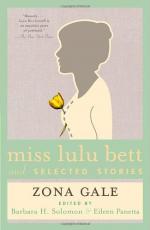They asked him the usual questions, and he replied, rocking all the time with a faint undulating motion of head and shoulders: Warbleton was one of the prettiest little towns that he had ever seen. He liked the people—they seemed different. He was sure to like the place, already liked it. Lulu came to the door in Ninian’s thin black-and-white gown. She shook hands with the stranger, not looking at him, and said, “Come to supper, all.” Monona was already in her place, singing under-breath. Mrs. Bett, after hovering in the kitchen door, entered; but they forgot to introduce her.
“Where’s Di?” asked Ina. “I declare that daughter of mine is never anywhere.”
A brief silence ensued as they were seated. There being a guest, grace was to come, and Dwight said unintelligibly and like lightning a generic appeal to bless this food, forgive all our sins and finally save us. And there was something tremendous, in this ancient form whereby all stages of men bow in some now unrecognized recognition of the ceremonial of taking food to nourish life—and more.
At “Amen” Di flashed in, her offices at the mirror fresh upon her—perfect hair, silk dress turned up at the hem. She met Cornish, crimsoned, fluttered to her seat, joggled the table and, “Oh, dear,” she said audibly to her mother, “I forgot my ring.”
The talk was saved alive by a frank effort. Dwight served, making jests about everybody coming back for more. They went on with Warbleton happenings, improvements and openings; and the runaway. Cornish tried hard to make himself agreeable, not ingratiatingly but good-naturedly. He wished profoundly that before coming he had looked up some more stories in the back of the Musical Gazettes. Lulu surreptitiously pinched off an ant that was running at large upon the cloth and thereafter kept her eyes steadfastly on the sugar-bowl to see if it could be from that. Dwight pretended that those whom he was helping a second time were getting more than their share and facetiously landed on Di about eating so much that she would grow up and be married, first thing she knew. At the word “married” Di turned scarlet, laughed heartily and lifted her glass of water.
“And what instruments do you play?” Ina asked Cornish, in an unrelated effort to lift the talk to musical levels.
“Well, do you know,” said the music man, “I can’t play a thing. Don’t know a black note from a white one.”
“You don’t? Why, Di plays very prettily,” said Di’s mother. “But then how can you tell what songs to order?” Ina cried.
“Oh, by the music houses. You go by the sales.” For the first time it occurred to Cornish that this was ridiculous. “You know, I’m really studying law,” he said, shyly and proudly. Law! How very interesting, from Ina. Oh, but won’t he bring up some songs some evening, for them to try over? Her and Di? At this Di laughed and said that she was out of practice and lifted her glass of water. In the presence of adults Di made one weep, she was so slender, so young, so without defences, so intolerably sensitive to every contact, so in agony lest she be found wanting. It was amazing how unlike was this Di to the Di who had ensnared Bobby Larkin. What was one to think?




